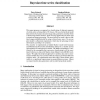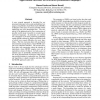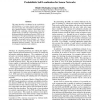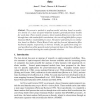107
Voted
NIPS
2001
15 years 1 months ago
2001
This paper proposes an approach to classification of adjacent segments of a time series as being either of classes. We use a hierarchical model that consists of a feature extract...
115
click to vote
IJCAI
2001
15 years 1 months ago
2001
A new, general approach is described for approximate inference in first-order probabilistic languages, using Markov chain Monte Carlo (MCMC) techniques in the space of concrete po...
128
click to vote
FCS
2006
15 years 1 months ago
2006
We prove an upper bound on the convergence rate of Markov Chain Monte Carlo (MCMC) algorithms for the important special case when the state space can be aggregated into a smaller ...
AAAI
2006
15 years 1 months ago
2006
This paper describes a technique for the probabilistic self-localization of a sensor network based on noisy inter-sensor range data. Our method is based on a number of parallel in...
104
Voted
AAAI
2006
15 years 1 months ago
2006
Intelligent agents must be able to handle the complexity and uncertainty of the real world. Logical AI has focused mainly on the former, and statistical AI on the latter. Markov l...
107
Voted
NAACL
2007
15 years 1 months ago
2007
This paper presents two Markov chain Monte Carlo (MCMC) algorithms for Bayesian inference of probabilistic context free grammars (PCFGs) from terminal strings, providing an altern...
GEOINFO
2007
15 years 1 months ago
2007
Abstract. We present a method to perform model selection based on predictive density in a class of spatio-temporal dynamic generalized linear models for areal data. These models as...
EVOW
2008
Springer
15 years 2 months ago
2008
Springer
Abstract. Many efforts have been involved in association study of quantitative phenotypes and expressed genes. The key issue is how to efficiently identify phenotype-associated gen...
116
click to vote
ECCV
2006
Springer
15 years 4 months ago
2006
Springer
Tracking body poses of multiple persons in monocular video is a challenging problem due to the high dimensionality of the state space and issues such as inter-occlusion of the pers...
103
Voted
KDD
2010
ACM
15 years 4 months ago
2010
ACM
Many social networks can be characterized by a sequence of dyadic interactions between individuals. Techniques for analyzing such events are of increasing interest. In this paper,...




